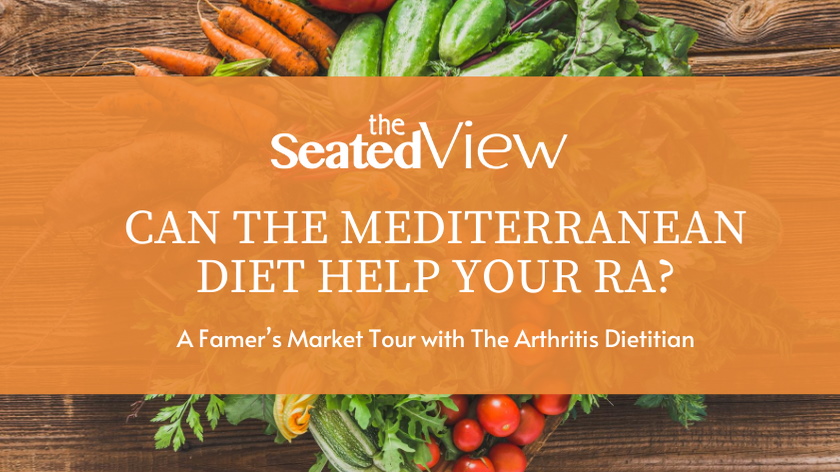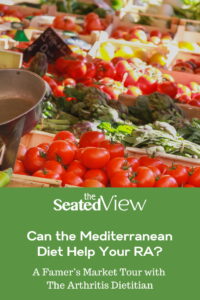Can the Mediterranean Diet Help Your RA? A Famer’s Market Tour with The Arthritis Dietitian

Could your rheumatoid arthritis (RA) respond to diet? The research jury is out on most except the Mediterranean diet, also called the anti-inflammatory diet. Filled with colorful vegetables, pulses (beans and lentils), and healthy fats, this way of eating isn’t just good for your body, it’s a feast for the eyes, as well. Join Cristina Montoya, The Arthritis Dietitian, and I as we take a (virtual) trip to the Farmers Market for what you need to make Mediterranean-style dishes that just might help your joints feel better, too.
But first, the science
The benefits of the Mediterranean diet include lowering cholesterol and risk of heart disease and combined with other lifestyle changes, be part of what helps you prevent heart disease, stroke, diabetes, perhaps even cancer.
This diet can play a role in reducing the risk of developing RA, especially among men and in seropositive RA. Studies have also found that the ingredients in the Mediterranean diet can reduce chemicals connected to inflammation, improve important systemic factors in RA, such as heart health, and has the potential for reducing joint pain and improving function. Rheumatologists are increasingly suggesting that dietary changes, especially the Mediterranean diet, should be part of an RA treatment regimen.
Eating the rainbow
“Everything was fresh and everything was local,” said Montoya, a registered dietitian from Toronto, Canada. She grew up in Colombia, eating what she calls “the peasant diet,” with simple and flavourful local foods, very much like the Mediterranean diet. And there’s no better place than a farmers market to find these kinds of foods. Montoya suggested thinking of the rainbow to help you store up antioxidants for the winter months. Always remember that “the more vibrant, the better.”
Start with the deep blue and purple of berries, cherries, plums, loaded with anthocyanin, an antioxidant that’s helpful to your eyesight and in fighting depression and heart disease. Next, Montoya suggested you pick up tomatoes and strawberries to get your hit of lycopene, an antioxidant with anti-inflammatory effects “Especially for people who have mouth sores, Sjögren’s syndrome or inflammation in the mouth,” she said.
You may have heard that people with RA should stay away from nightshade vegetables, such as tomatoes, potatoes, and eggplant because they trigger inflammation, but these reports tend to be anecdotal. Like so many other things with RA, it’s individual. “I think it’s really dependent on how a person responds to it. I don’t generalize,” Montoya said, explaining that tomato has some great benefits, especially when cooked. “It helps to release the lycopene,” she said.
The next colours on the rainbow are yellow and orange and guess what? Carrots really are indeed good for the eyes, containing beta-carotenoids, an antioxidants that help your vision. Moving through to the greens, think leafy vegetables, broccoli, even kiwi — all sources of chlorophyll and beta-carotene, good for the teeth. Make sure to add white, in the form of onions, garlic, and pears to your shopping list for their potential cancer preventing properties.

Packing the protein
You have a lot of options when it comes to protein. If in a previous life you were a poor peasant in the Mediterranean, chances are you wouldn’t be eating a lot of red meat, maybe only twice a month, so treat that as a luxury item. Montoya recommends using poultry and fatty fish, such as salmon, tuna, and mackerel, high in omega-3 fatty acids, which are good for your heart health, about two days a week each. Eggs as a good source of protein and she admits to a bias, saying “growing up in a third world country, eggs were a primary source of protein.”
If you’re vegan or cutting down on the amount of meat in your diet, there’s a treasure trove of pulses to choose from, such as beans, chickpeas, lentils, tofu, Impossible or Incredible burgers, pea protein, and more. All can be made into delicious, RA-friendly dishes.
Whole grains are best
Cutting out grain in your diet make sense if you’re sensitive to gluten, but when you aren’t, remember that whole grains are an important source of fibre and essential nutrients. Some people with RA report that eliminating gluten has helped their symptoms, whereas for others, there is no change. If you’re interested in trying to get by without gluten, check out amaranth, buckwheat, quinoa, or flax.
Healthy fats
Olive oil is the cornerstone of the Mediterranean diet and Montoya suggested considering the foursome of age, heat, air, and light for it. Make sure that it is less than 18 months when you buy it, or it can go rancid. Store it in a cool, dark area, to avoid light leaching out the antioxidants. “Cold pressed is best, because it has most of the antioxidants,” she said, and is especially good for salads. When cooking with oil, choose avocado, grapeseed, peanut, and sunflower oils which have a higher smoke point. Healthy fats are also in fish and other fatty foods like avocado, as well as nuts and seeds.
Is dairy necessary?
Your local farmers market can also be a great place to find ethically-sourced dairy from grass fed cows. A 2019 study found that dairy can help prevent a number of chronic disease, and it is of course a great source of protein and calcium. Experts recommend up to 1500 mg of calcium per day for people who live with inflammatory conditions to protect against a higher risk of osteroporosis. Montoya prefers picking up fermented types of dairy, such as yogurt or aged cheeses, which “helps with the microbiome.” She chooses full fat because “it helps with satiety and you’re never really going to eat a lot of it, right?”
If you are lactose intolerant or vegan, include varied sources of protein in your diet, and look for calcium-enriched juices and plant-based milks. Supplementing with calcium and vitamin D (necessary for your body to absorb the calcium) is always a good idea, especially when you have RA. Your doctor or naturopath can recommend best options for you.
When to choose organic
Your farmers market is the perfect place to find foods that hit the trifecta of what we see as healthy: local, seasonal, and organic. Research shows that organic foods may have more nutrients, especially antioxidants in produce, omega-3 fatty acids in meats, dairy, and eggs, and of course less pesticides. You’ve probably heard of the “Dirty Dozen,” fruit and vegetables that retain the most pesticide residue — strawberries, spinach, and kale are at the top of the list — and you may want to choose the organic versions of these. If you can’t afford organic, Montoya said washing your produce thoroughly under running water for 20 seconds or so should do it. Don’t waste your money on vegetable washers — research shows they probably don’t work.
Wine with that?
Wine in moderation, especially red, is commonly recognized as helping your heart health, but before you pop over to the wine vendor, think about whether it’s a good choice when you have RA. Resveratrol, a compound in red wine, can have anti-inflammatory properties, but alcohol isn’t always a good mix with certain RA meds, especially those that are metabolized through the liver. Talk to your rheumatologist before you imbibe.
Food made with fresh ingredients from your farmers market will make your mouth and belly happy, and perhaps also the rest of you. Is it guaranteed to make your RA feel better? Well, no. People react differently to medications, and also to diet. But this kind of deliciousness is worth a try and chances are it will contribute to improving your general health.
Learn more about nutrition and RA from The Arthritis Dietitian.
Check my sources:
The Mediterranean diet and RA:
Altomara, Roberta, et.al. “The Mediterranean Diet: a History of Health.” Iran J Public Health. 2013; 42(5): 449–457.
Forsyth, C., et.al.,. (2017). The effects of the Mediterranean diet on rheumatoid arthritis prevention and treatment: A systematic review of human prospective studies. Rheumatology International, 38(5), 737-747. doi:10.1007/s00296-017-3912-1
Johansson, K., Askling, J., Alfredsson, L., & Giuseppe, D. D. (2018). Mediterranean diet and risk of rheumatoid arthritis: A population-based case-control study. Arthritis Research & Therapy, 20(1). doi:10.1186/s13075-018-1680-2
Khanna, S., Jaiswal, K. S., & Gupta, B. (2017). Managing Rheumatoid Arthritis with Dietary Interventions. Frontiers in Nutrition, 4. doi:10.3389/fnut.2017.00052
Paturel, A. (n.d.). The Ultimate Arthritis Diet. Retrieved July 29, 2020, from https://www.arthritis.org/health-wellness/healthy-living/nutrition/anti-inflammatory/the-ultimate-arthritis-diet
Meditarranean diet benefits:
Andersen, L. (2017, January 04). Foods to Eat With Rheumatoid Arthritis (And Some to Avoid). Retrieved July 29, 2020, from https://www.healthcentral.com/slideshow/what-people-rheumatoid-arthritis-should-and-shouldnt-eat/?ap=420
Dairy and alternatives in your diet. (n.d.). Retrieved July 29, 2020, from https://www.nhs.uk/live-well/eat-well/milk-and-dairy-nutrition/
DeSanto, L. (2019, August 21). Dairy Products May Reduce Your Risk for Chronic Illness. Retrieved July 29, 2020, from https://www.healthcentral.com/article/reduce-chronic-disease-risk-dairy-products/?ap=420
Fish and Omega-3 Fatty Acids. (n.d.). Retrieved July 29, 2020, from https://www.heart.org/en/healthy-living/healthy-eating/eat-smart/fats/fish-and-omega-3-fatty-acids
Horgan, K. (2020, May 13). The Clean 15 & Dirty Dozen List Of Foods (2020 Update). Retrieved July 29, 2020, from https://blog.givingassistant.org/dirty-dozen-clean-15-list/
Morris, M. (2017, October 09). 15 Things to Buy at the Farmers’ Market. Retrieved July 29, 2020, from https://www.eatthis.com/farmers-market/
Regal, C. (2016, November 08). 10 Foods That Fight Inflammation. Retrieved July 29, 2020, from https://www.healthcentral.com/slideshow/foods-that-fight-inflammation/?ap=420
Supplement and Herb Guide for Arthritis Symptoms . (n.d.). Retrieved July 29, 2020, from https://www.arthritis.org/health-wellness/treatment/complementary-therapies/supplements-and-vitamins/supplement-and-herb-guide-for-arthritis-symptoms
Sjogren’s and mouth inflammation:
Sjogren’s syndrome. (2020, July 22). Retrieved July 29, 2020, from https://www.mayoclinic.org/diseases-conditions/sjogrens-syndrome/symptoms-causes/syc-20353216
Emrich, L. (2018, June 19). Rheumatoid Arthritis and Dental Problems. Retrieved July 29, 2020, from https://www.healthcentral.com/article/dental-health-the-complex-relationship-between-periodontal-disease-and-ra/?ap=420
Do vegetable washes work?
Larson, Lauren. “7 Myths about Washing Your Produce.” Modern Farmer, generally 19, 2015. https://modernfarmer.com/2015/01/7-myths-washing-produce (accessed July 28, 2020)
19 Comments
Read More
Discover what else I've been writing about...
















I love the Mediterranean diet. I love fish especially. Salmon, swordfish, cod, and vegetables. darn now I am hungry.
It’s so tasty, colorful and flavourful. I am happy to be in Canada and be exposed to the MedDiet culture 🙂
We have been trying to add more MedDiet recipes to our dinner menu. They are so tasty!
This does a great job of outlining the diet and its many benefits. I’m glad to see that nightshades aren’t necessarily off limits unless someone has an issue with them. I appreciate you including the sources, too!
I’ve vaguely heard about this diet but I didn’t know much about it. This article was quite helpful to read and I learned a lot about it, thanks for sharing this.
I have been reading so much lately about how inflammation is the cause of so many issues in the human body so it makes sense that a diet rich in anti-inflammatory foods would help with the condition. I’m goign to read more into this for sure.
I have a few books that cover the Mediterranean diet. You have provided some great information on the diet in this post. I really like how this diet has many great benefits to it. Thanks so much for sharing.
I’ve been noticing different oils at the grocery stores. Such as coconut, avocado, grapeseed, peanut, and sunflower. I have yet to try, but after reading more about the mediterranean diet I’m more likely to try 😉
This was a great article that appears really well researched. For any type of illness, perhaps the first place to start is what we can control the most, which is our diet!
I many have to try this, I love my Mediterranean food anyway so this is deffo my kind of thing x
Can’t ever go wrong with eating fresh and eating local! I often think that Kale might be a superfood but if it needs to be imported to where you live, using who knows what methods of preservation – is it really that much superior to the leafy greens in your local market?
Love the colour identifiers for making sure you get all the right nutrients!
This is great information. I’m honestly surprised by the number of people who overlook the power of food for preventing or treating various health-related concerns. We’ve come to rely on modern medicine to fix everything, however, there are often many options to consider before medication even comes into the mix! While I am not living with RA, I was aware of quite a few of these foods for their anti-inflammatory abilities due to a longterm knee injury. However, you gave me some ‘food for thought’ so that I can improve upon my current dietary choices. Thank you!
What a well researched post! I love how you added all of your sources at the end. I really enjoy a Mediterranean diet, so it is great to hear that it also has certain health benefits. Starting with diet changes is such an easy and intuitive way to go if we experience health problems. Definitely worth trying before going for medications or other types of treatment.
I think Mediterranean diet is so delicious, I would most likely gain weight if I don’t watch it. but at the same time, it’s probably the only diet I might be willing to try (aside from diet said to be followed by doctor)
I don’t eat much fish, but other than that, the Mediterranean diet sounds wonderful. Inflammation causes so many problems!
This is such a well researched article and very informative. Just yesterday I came to know about someone close who got an attack after many years and was writhing in pain for the last two days. I am suggesting him to read this article. Thanks for sharing which could benefit many.
Mediterranean dishes are so juicy. They are my favorite.
I need to be better about eating the rainbow. And it’s good to hear eating yogurt was encouraged, it makes me sad when I think about cutting out dairy completely. Definitely adjusting my diet tomorrow!
This is the second time this week I’ve seen someone reference nightshades. Which I had never heard of before, but it is certainly interesting. I’ve been making it a point to steer clear of processed foods lately and I’m noticing a big difference in my sleep quality and ability to focus. After reading this, I’m really interested in trying the Mediterranean diet.